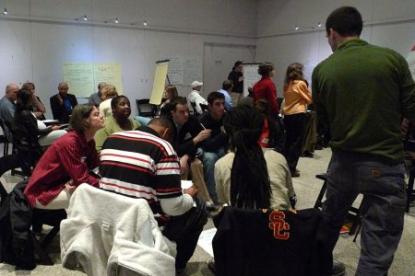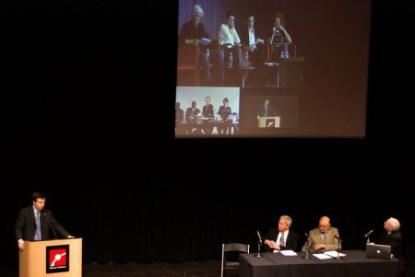"Our earth is like a patient with a fever. We must collaborate to save her by sharing our wisdom so as to provide economical and technological remedies to avoid +2 degrees damage.”
– Recommendation from WWViews deliberations in Japan

Participants deliberating during World Wide Views at the Museum of Science. Photo by Richard Sclove.
On September 26, 2009, approximately 4,000 laypeople in 38 countries, on six continents, made recommendations on climate change policy for consideration by delegates at the recent United Nations Climate Change Conference (COP-15). The first-ever global citizen deliberation on international policy,called World Wide Views on Global Warming (WWViews), was organized by the Danish Board of Technology, an institution with a long-standing history of including the voices and recommendations of the public in the formulation of policy. As discussed previously, The Museum of Science was one of five sites hosting deliberations in the US, in partnership with the Brookfield Institute and faculty at Boston University School of Public Health, Environmental Health Department.
The detailed results of the deliberations can be viewed online. The recommendations from various particular nations can be compared to the overall results, as well as to one another. The following highlights a few of the results from the global deliberations,comparing them with public opinion polls and results of the COP-15 negotiations.
All WWViews participants were given a 40-page booklet, translated into several languages, containing background information on the science, what is understood and what is still uncertain about global warming, and a number of possible policy options for mitigating or adapting to the risks of a changing climate (adapted from the IPCC’s fourth assessment report). On the day of deliberations, the approximately 100 participants at each location considered twelve questions relating to four main themes: long-term climate goals, short-term urgency, emission targets for developed and developing countries, and financing strategies for mitigation and adaptation. The concluding session gave the participants an opportunity to develop recommendations of their own that were voted on at each site, and the ones receiving the most votes were included in the COP-15 policy report, which was assembled by the Danish Board of Technology.
Among WWViews participants, there was near unanimity on the importance of making a deal at COP-15. Globally, 91% of participants said that it was “urgent” for a deal to be made at COP-15, while only 7% thought that waiting until later would be satisfactory. In the US, 90% of all participants recommended urgency, with Massachusetts residents voting urgent at 97%. This is quite different from a recent poll by the Pew Research Center whose results suggested that only about half of Americans believe that the earth’s temperature is warming.
Nearly 90% of the global participants recommended that policies seek to limit an inevitable planetary temperature increase to 2 degrees Celsius or less, while approximately half felt that 2 degrees was insufficient. Only 4% of all participants thought a temperature rise of greater than 2 degrees was acceptable. The agreements made at COP-15 appear to fall short of this goal. The “Climate Interactive Scoreboard” team, a collaboration of climate scientists and economists, projects that the formal proposals made by nations at COP-15 might translate to a temperature rise of 3.9 degrees Celsius by 2100, and that even proposals to which the nations are not committed might produce a temperature rise of no lower than 2.9 degrees.
WWViews results showed overwhelming support (89% globally and among both Annex I and non-Annex 1 nations) for carbon emission reductions of 25-40% or more from 1990 levels by 2020 among the highly developed Annex 1 countries. –Even in the US, 87% of Americans who participated in WWViews recommended reductions of 25% or more by 2020. In comparison, the US administration has proposed a 17 percent reduction from 2005 concentration, which translates to only a 4 percent reduction from 1990 levels.
These results are somewhat mirrored when considering rapidly developing nations like India, South Africa, China, and Brazil; 76% of the global participants recommended a reduction in the carbon emissions of these countries. Of these, 27% thought the reductions in these nations should be the same as for the Annex 1 nations, while 49% thought the reductions should be proportional with income and existing emission levels).
Other questions considered by the participants centered on technology transfer, financing, and the role of international institutions in creating standards for implementing climate policy. In general, participants felt that a financial mechanism for helping developing countries avoid and adapt to climate change was essential and that strong punishments should be put into place for countries that did not honor their commitments for a new climate deal.

Participants formulating recommendations during World Wide Views. Photo by David Rabkin.
Participants were also given the job of developing open-ended recommendations to the delegates at COP-15. The most popular (determined by voting) recommendation from Massachusetts was:
“Global climate action needed NOW!!
Wealthy countries must transform the industrial base and promote cultural change, using education, marketing, shared technology, transparent implementation and universal measures through global cooperation while mitigating impacts on vulnerable people.”
When considering both the results of the closed-ended WWViews questions and the open-ended recommendations, the message is quite clear: WWViews participants expected more than was delivered in Copenhagen. As the Danish Board of Technology observed in the policy summary, these results suggest that “the more people learn about and consider climate change issues, the tougher they want climate change policies to be.”
Efforts to disseminate the results of WWViews started after the day of the September 26th event and continue today. Heads of state, local officials, and stakeholders all over the world have been presented with the results, and a number of high-profile publicity events have been organized by WWViews hosts. Richard Sclove, from Amherst, MA and author of the book Democracy and Technology (1995, Guilford Press) was the US liaison for World Wide Views. , He has worked with participants at all US sites, presented the results to the US Office of Science and Technology Policy, and written a number of articles on the process and the results. Here in Boston, we recently held a live three-way transatlantic conference with La Cite des Science, the largest science center in Europe, and the Danish Board of Technology in Copenhagen to share the results with COP-15 delegates and other stakeholders, and to give audiences at both locations and on the internet the opportunity to ask questions. The program was presented as part of the International Action on Global Warming Program of the Association of Science and Technology Centers. Materials from WWViews, including the results are also being used in graduate public health courses to illustrate the importance of public deliberation on scientific and health policies.

The WWViews Transatlantic Conversation on December 5, 2009. Shown on the screen on top are panelists at La Cite des Science in Paris and WWViews planners Lars Kluver and Bjorn Bedstead from the Danish Board of Technology in Copenhagen, along with Trento Muganda, a COP-15 delegate from the Democratic Republic of the Congo.
Panelists in Boston included Peter Schultz, moderator and recent director of the US Climate Change Science Program Office, Anthony "Bud" Rock, CEO of the Association of Science and Technology Centers and former US principal deputy assistant secretary of state for oceans, environment, and science, Henry "Jake" Jacoby from MIT, co-director of thet MIT Joint Program on the Science and Policy of Global Change, and Bob Corell, chair of the Climate Action Initiative and global change program director at the H. Heinz Center for Science, Econmics, and the Environment. Photo by David Rabkin.
Perhaps the most important result, however, is the establishment of a global network of diverse partners that may be tapped for future deliberations. WWViews represents an important step in engaging the global public in substantive conversations around emerging issues in science and technology with vast social and moral implications. Rather than focusing on interpretations by experts or the media, programs like WWViews engage the public in learning about, considering, and making informed recommendations on issues and policies that directly affect them through a process of participatory assessment. As we read reports in the press that many delegates of COP-15 found the structure of the conference to be undemocratic and frustrating, World Wide Views should be considered as strong model for public participation and input going forward that can inform policymaking in a global, inclusive and democratic way.
David Sittenfeld, coauthor of this essay, is Manager of the Forum Program at the Museum of Science. Madeleine Kangsen Scammell is an Assistant Professor of Environmental Health at Boston University School of Public Health.


